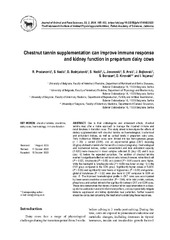Приказ основних података о документу
Chestnut tannin supplementation can improve immune response and kidney function in prepartum dairy cows
| dc.creator | Prodanović, Radiša | |
| dc.creator | Nedić, Sreten | |
| dc.creator | Bošnjaković, Dušan | |
| dc.creator | Nedić, Svetlana | |
| dc.creator | Jovanović, Ljubomir | |
| dc.creator | Arsić, Sveta | |
| dc.creator | Bojkovski, Jovan | |
| dc.creator | Borozan, Sunčica | |
| dc.creator | Kirovski, Danijela | |
| dc.creator | Vujanac, Ivan | |
| dc.date.accessioned | 2024-03-25T14:59:42Z | |
| dc.date.available | 2024-03-25T14:59:42Z | |
| dc.date.issued | 2024 | |
| dc.identifier.issn | 1230-1388 | |
| dc.identifier.uri | https://vet-erinar.vet.bg.ac.rs/handle/123456789/3784 | |
| dc.description.abstract | Due to their antiketogenic and antioxidant effects, chestnut tannins may offer a viable approach to manage the impaired immune and renal functions in transition cows. This study aimed to investigate the effects of dietary supplementation with chestnut tannins on haematological, biochemical and antioxidant indices, as well as cortisol levels in prepartum dairy cows. Forty multiparous Holstein cows were divided into two homogeneous groups (n = 20): a control (CON), and an experimental group (CNT) receiving 20 g/day of chestnut tannins for the last 25 ± 2 days of pregnancy. Haematological and biochemical indices, cortisol concentration and total antioxidant capacity (T-AOC) were measured in blood samples collected 25 (day −25) and 5 days (day −5) before the expected parturition. The addition of chestnut tannins exerted no significant effect on red blood cells indices; however, white blood cell (P = 0.02), lymphocyte (P = 0.05) and platelet (P < 0.01) counts were higher, while the neutrophil to lymphocyte ratio (P = 0.03) was lower on day −5 in the CNT group compared to the CON group. Significantly higher values of T-AOC (P = 0.03) and significantly lower levels of triglycerides (P = 0.03) and gammaglutamyl transferase (P = 0.02) were also found in CNT compared to CON on day −5. The improved haematological profile in CNT cows was accompanied by lower serum creatinine concentration (P = 0.04), while total protein, calcium, phosphorus and cortisol did not differ significantly between CNT and CON cows. These data demonstrate that dietary chestnut tannin supplementation in a closeup diet has antioxidant and anti-inflammatory effects, and could potentially mitigate immune suppression and kidney dysfunction near parturition. Further research should be conducted concerning the mechanisms underlying these responses. | sr |
| dc.language.iso | en | sr |
| dc.publisher | Kielanowski Institute of Animal Physiology and Nutrition, Polish Academy of Sciences in Jabłonna (Poland) | sr |
| dc.publisher | Kielanowski | sr |
| dc.relation | info:eu-repo/grantAgreement/ScienceFundRS/Ideje/7750295/RS// | sr |
| dc.rights | openAccess | sr |
| dc.rights.uri | https://creativecommons.org/licenses/by/4.0/ | |
| dc.source | Journal of Animal and Feed Sciences | sr |
| dc.subject | chestnut tannins | sr |
| dc.subject | creatinine | sr |
| dc.subject | dairy cows | sr |
| dc.subject | haematology | sr |
| dc.subject | immune function | sr |
| dc.title | Chestnut tannin supplementation can improve immune response and kidney function in prepartum dairy cows | sr |
| dc.type | article | sr |
| dc.rights.license | BY | sr |
| dc.citation.volume | 33 | |
| dc.citation.issue | 2 | |
| dc.citation.spage | 185 | |
| dc.citation.epage | 192 | |
| dc.identifier.doi | 10.22358/jafs/174065/2023 | |
| dc.identifier.fulltext | http://veterinar.vet.bg.ac.rs/bitstream/id/11327/bitstream_11327.pdf | |
| dc.type.version | publishedVersion | sr |

